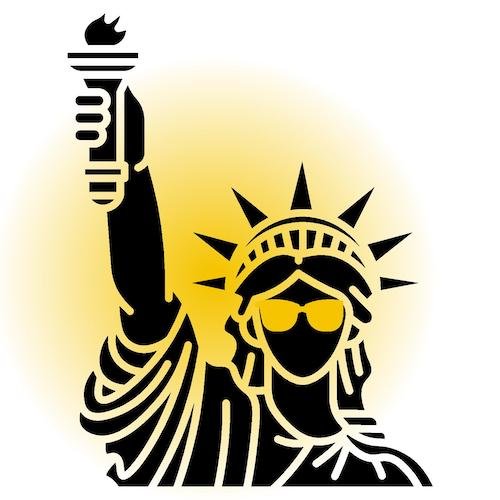In the constantly changing world of international finance, cryptocurrencies and digital economies stand out as groundbreaking innovations, pushing the boundaries of conventional financial structures and transforming our perception of how money transactions can be conducted. At the heart of this transformation is a philosophy that resonates deeply with libertarian ideals: the pursuit of financial freedom and individual autonomy.
This article delves into the libertarian perspective on cryptocurrencies and digital economies, exploring how these modern financial tools embody the principles of minimal government intervention, free markets, and the unyielding belief in personal liberty.
The Libertarian Stance on Economic Freedom
Libertarianism champions the cause of minimal government involvement in the personal and economic lives of individuals. It holds individual liberty, property rights, and free markets as its core principles, arguing that society flourishes when individuals have the freedom to pursue their interests with minimal state intervention. Economic freedom, a cornerstone of libertarian thought, is the unrestricted ability to participate in market transactions, own property, and engage in entrepreneurial endeavors without undue governmental restrictions.
Cryptocurrencies, by their very nature, are a testament to the libertarian vision of economic freedom. They represent more than just a new form of currency; they are a radical reimagining of how financial transactions can be conducted outside the purview of centralized authorities. By enabling peer-to-peer transactions without the need for traditional banking intermediaries, cryptocurrencies offer a glimpse into a world where financial autonomy is not just possible but embraced.
Evolution of Cryptocurrency: A Libertarian Victory
The story of cryptocurrency begins with Bitcoin, introduced in 2009 by an individual or group under the pseudonym Satoshi Nakamoto. Bitcoin’s creation was rooted in a deep skepticism of centralized financial systems and government-controlled fiat currencies, which are often subject to manipulation and inflation. Cryptocurrencies emerged as a libertarian solution to these concerns, offering a decentralized and secure means of conducting transactions.
Since then, the cryptocurrency market has expanded exponentially, with thousands of digital currencies now in circulation. This growth has not only challenged traditional banking and financial institutions but has also forced a global reckoning with the very nature of money and monetary policy. For libertarians, the rise of cryptocurrency is a victory, signifying the potential for a free market to innovate solutions that empower individuals and reduce governmental dominance.
Digital Economies and Decentralization
Digital economies are built upon the infrastructure of the internet, enabling the exchange of goods, services, and currencies in a virtual environment. At the core of these economies is the concept of decentralization, particularly exemplified by blockchain technology, which underpins most cryptocurrencies. Unlike traditional financial systems, which rely on central authorities (such as banks and governments) to verify transactions, blockchain technology allows for secure, transparent, and tamper-proof record-keeping through a distributed network of computers.
Decentralization offers several benefits from a libertarian viewpoint. It reduces the potential for fraud and corruption, increases transparency in transactions, and most importantly, diminishes the control that central authorities have over the economy. By facilitating a system where transactions are verified by consensus among participants rather than a central body, digital economies embody the libertarian ideal of a market that regulates itself without the need for governmental oversight.

Cryptocurrency and Individual Autonomy
One of the most compelling arguments for cryptocurrencies from a libertarian perspective is the degree of individual autonomy they offer. Digital currencies enable individuals to manage their finances in a private and secure manner. Transactions made in cryptocurrencies can be designed to preserve the privacy of the parties involved, a feature that is increasingly appealing in an era where financial surveillance by governments is a growing concern.
Moreover, cryptocurrencies empower individuals to bypass traditional financial intermediaries, such as banks, that may impose their own fees, restrictions, and conditions on transactions. This disintermediation not only reduces costs but also places the power of financial decision-making directly into the hands of individuals. In this sense, cryptocurrencies are not just a new form of money; they are a tool for asserting personal freedom and challenging the status quo of financial governance.
This exploration into the alignment of cryptocurrency with libertarian values highlights the profound impact digital currencies and economies could have on the principles of freedom, autonomy, and minimal government intervention. By embodying these ideals, cryptocurrencies offer a fascinating glimpse into a future where economic transactions are more directly under the control of individuals, rather than being mediated by traditional financial institutions and government regulations.
Challenges and Criticisms
Despite the enthusiasm surrounding cryptocurrencies from a libertarian perspective, there are several challenges and criticisms that cannot be overlooked. The volatility of cryptocurrency markets is perhaps the most cited concern, with dramatic fluctuations in value posing a risk to those looking to digital currencies as a stable store of value. Additionally, the regulatory landscape for cryptocurrencies remains uncertain, with governments around the world grappling with how to oversee these digital assets without stifling innovation.
Libertarians argue that while these challenges are significant, they are not insurmountable. In response to concerns about scalability and the environmental impact of mining activities, the crypto community is actively exploring solutions such as proof-of-stake algorithms, which are less energy-intensive than traditional proof-of-work models.
Libertarians call for the minimal interference of government in economic affairs, emphasizing the importance of an unregulated market that allows for the free development and growth of the digital economy, while trusting market forces and voluntary exchanges to safeguard consumer interests.
The Future of Money: Libertarian Predictions
As we look to the future, the role of cryptocurrencies and digital economies in shaping the global financial landscape cannot be underestimated. Libertarians predict that as technology continues to evolve, we will see an increasing shift towards digital currencies, which offer unparalleled advantages in terms of efficiency, security, and privacy. This shift is expected to accelerate the decentralization of financial systems, reducing the influence of central banks and governments in monetary policy and financial transactions.
The potential for mass adoption of cryptocurrencies presents a promising scenario for the advancement of libertarian goals. A world in which individuals have greater control over their financial assets, free from the oversight and intervention of central authorities, aligns closely with libertarian ideals of freedom and autonomy. However, this future also poses challenges, including the need for widespread education on digital currencies and the development of infrastructure to support their use in everyday transactions.
Libertarians highlight the importance of minimal government involvement in the face of cryptocurrency’s growth. Some officials see digital currencies as threats to national security and economic stability. However, libertarians argue for the crypto sector’s freedom to innovate and operate. They believe in the power of the market to self-regulate. Their stance suggests that solutions should emerge from an unrestricted market, not from regulatory impositions. This approach aims to address concerns naturally, through the market’s own mechanisms.
Conclusion
The alignment of cryptocurrency with libertarian values is clear: both champion the principles of economic freedom, individual autonomy, and minimal government intervention. As digital currencies continue to evolve, they offer a compelling alternative to traditional financial systems, one that promises to empower individuals and reshape the global economy. While challenges remain, the potential of cryptocurrencies to advance the goals of a freer, more decentralized world is undeniable. As we stand on the cusp of this financial revolution, the future of money looks increasingly digital, and its development will undoubtedly be influenced by the values and debates that have shaped the libertarian perspective on cryptocurrencies and digital economies.




